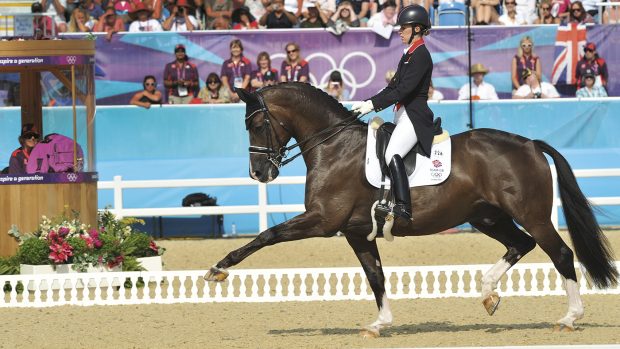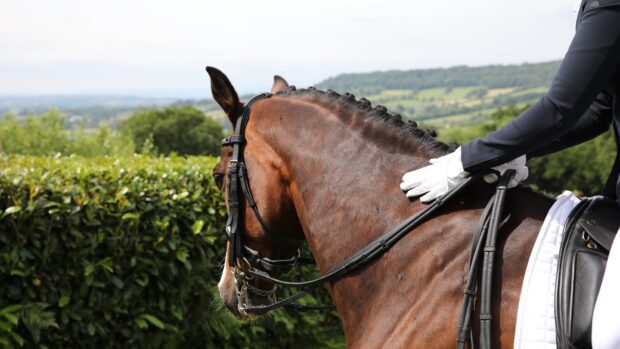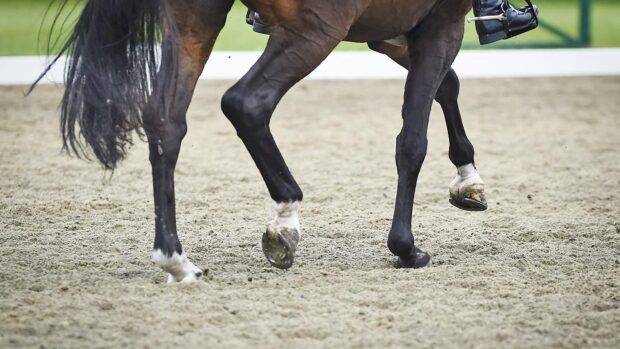A clarification of an existing British Dressage (BD) rule has sparked discussion over de-nerving.
The 2022 BD rule specifically mentions neurectomy, which is a procedure whereby all or part of a nerve is cut to provide relief from pain. But neurectomy is a broad term that covers variations of the procedure, and there are cases in which regeneration is possible.
“A horse is not eligible to compete when a limb or part of a limb, is hyposensitive or hypersensitive (both of which shall constitute ‘abnormal’ limb sensitivity),” states the rule. “Hypersensitive limbs have an excessive or abnormal reaction to palpitation. Hyposensitive limbs include any alteration in sensitivity induced by a neurectomy or chemical desensitisation.”
The addition comes under the existing code of conduct for horse welfare section, in which surgical procedures were already referenced, and gives specific mention to neurectomy and limb sensitivity.
Susan Saward opted for the procedure before the clarification, a decision she says she made in the best interests of her horse’s welfare.
She told H&H she bought Dolce, a part-bred Lipizzaner mare, now aged 13, as an unhandled youngster and has spent the past eight years training and enjoying her as a dressage horse, although at times she could be tense and unpredictable. Two years ago, her vet found a very old hock injury – which Dolce sustained in an accident as a two-year-old – had caused a problem with the mare’s suspensory ligament.
Ms Saward said she was advised by her vet that a partial neurectomy would mean Dolce would be more comfortable and while it was not allowed at FEI level, it would be fine for national dressage competitions.
She added that she was not pressured into the procedure, but decided on the advice given that it was the right thing to do for her mare. After 18 months of rehabilitation, Ms Saward said Dolce’s tension and unpredictability had gone, she is relaxed and “completely settled” and the horse is showing signs of “full feeling” in that leg. She said she has “never hidden” the fact Dolce had the procedure, fully believing it was BD-legal, and was “mortified” to discover otherwise.
“BD has said they have clarified the rule; if they are clarifying it, it wasn’t clear,” she told H&H, adding she has always wanted to do the right thing for her horse.
“I wouldn’t compete her if she wasn’t happy, I would just retire her.”
She feels strongly that horses’ passports should be marked if horses have had the procedure, so future owners are aware and can care for them appropriately.
She added she is very concerned about the bigger picture, in terms of what the clarification means for the future and welfare of other horses, particularly given it is not required to be declared.
Ms Saward also raised concerns the clarification does not encourage honesty, and questioned how BD intends to police this rule. She also suggested BD “draw a line”, with the rule applying going forwards, and look again at whether there is anything it can offer those who have had the procedure.
A BD spokesman told H&H: “This ruling has been in place for several years in British Dressage, as it has in other member bodies like BS [British Showjumping], BE [British Eventing] and EGB [Endurance BG] and internationally with the FEI.
“We’ve clarified the rule for 2022 which has brought it to the attention and the rule is clear, horses which have undergone neurectomy surgery at any time are not permitted to compete in BD competitions. We have the rule in place on welfare grounds and in the interests of a level playing field.
“Policing the rule is not easy as we rely on the honesty and personal responsibility of those signing up to membership with BD. However, we will act accordingly to investigate any horses who are reported as suspected to have had neurectomy surgery.”
The spokesman added: “The idea of having passports marked at the time of the procedure is an excellent one and while it doesn’t come under our jurisdiction, we’d support an approach to the British Equestrian Veterinary Association to raise the prospect.”
‘Clear rules are fundamental’
Lucy Grieve, immediate past president of the British Equine Veterinary Association and chair of its ethics and welfare committee, told H&H there are many factors to consider when thinking about horse welfare and neurectomies.
“It very much depends on which ‘neurectomy’ procedure we are discussing, as there are more than one,” she said.
“Most of the time the FEI [on which BD has based its rule] is talking about ‘proximal suspensory ligament neurectomies’, where there is actually a very low risk of catastrophic injury if you choose your cases carefully, which all vets should be doing.
“In these cases, a very small branch of a nerve and some surrounding fascia is removed to alleviate pain from the very top portion of the suspensory ligament. The rest of the limb is essentially unaffected and still has full nerve function.”
She added: “We don’t see suspensory neurectomy cases ‘breaking down’ if they have otherwise healthy limbs and good conformation. However, when talking about ‘palmar digital neurectomies’, where the sensation to the whole foot is removed, there is significant risk of serious injury where they are not managed very, very carefully.
“So, when considering the welfare of the horse, at least, there is much more to it than just whether ‘a neurectomy procedure’ has been performed or not.”
In terms of “competitive advantage”, it becomes a greyer area. Playing “devil’s advocate”, she said, the question remains over whether it is fair to withhold medical interventions from equine athletes and companions that under the right circumstances could allow them to live a more comfortable and active life.
“As with many things, the answer to these questions is never as black and white as we would like,” said Ms Grieve.
World Horse Welfare has welcomed the clarification on limb hyposensitivity.
“Having clear rules is fundamental to any effective regulatory system,” charity chief executive Roly Owers told H&H, adding that as the procedure “completely masks pain” associated with an injury, it is unethical in their view to compete a horse that has had it.
“However, this is a complicated issue, not least because neurectomy can be performed at different sites, one of which causes no change in skin sensitivity, and there are also cases where the regrowth of nerves has resulted in regained sensitivity,” he said.
“Given this it seems only right that there is full disclosure in the passport for horses that have undergone a neurectomy.”
France brought in new knowledge certificate laws this year for owners, which make it mandatory to register an equine neurectomy. The procedure is not banned in France, but is considered doping in competition (news, 13 January).
“This rule clarification will mean that some horses can no longer compete under British Dressage rules, which is clearly deeply unfortunate for the riders involved but is in the long-term interest of equine welfare and the sport,” added Mr Owers.
- What do you think? Send your thoughts to hhletters@futurenet.com, including your name, nearest town and country, and you could win a bottle of Champagne Taittinger
You might also be interested in:

Subscribe to Horse & Hound magazine today – and enjoy unlimited website access all year round
Horse & Hound magazine, out every Thursday, is packed with all the latest news and reports, as well as interviews, specials, nostalgia, vet and training advice. Find how you can enjoy the magazine delivered to your door every week, plus options to upgrade your subscription to access our online service that brings you breaking news and reports as well as other benefits.




